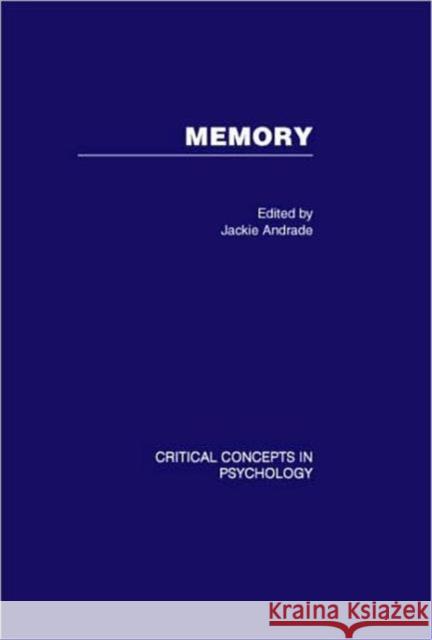Memory » książka
Memory
ISBN-13: 9780415413237 / Angielski / Twarda / 2007 / 2752 str.
The term memory encompasses our recollections of past experiences, our ability to keep track of what is happening from moment to moment, our stored knowledge, including knowledge of words and their meanings, our habits, our recognition of objects and faces, and our ability to remember to do things in the future. As such, an understanding of memory is central to an understanding of human behaviour. Memory supports our ability to speak and decode language, to find our way around, to make rational decisions, and to function successfully in society. Moreover, memory of past life-events contributes to our unique individual personalities. Memory research has a long and important history within psychology and it continues to have fascinating everyday applications. Memory research has also helped us to understand the effects of brain damage, and has also been used to predict scholastic achievement and language development. However, memory has become such a broad field of study and research that it is extremely hard to keep up to date with new developments. The sheer scale of the growth in memory research output and the breadth of the field makes this new collection from Psychology Press especially timely and welcome. It will enable ready access to the most influential and important works across the full gamut of the discipline, encouraging a broader appreciation of the field and mutual influences within it. Edited by a leading memory researcher, the four volumes in this collection on the structure of memory, memory processes (including theories of forgetting), working memory, and the constraints on memory bring together carefully selected key historical papers along with cutting-edge research. The organization of the collection, broadly by research domain, together with the editor s newly written Introduction, will enable users to make sense of the wide range of approaches, theories, and concepts that have informed memory research to date. It is an essential reference work destined to be valued as a vital research resource by all scholars and students of the subject.
"
The term ‘memory’ encompasses our recollections of past experiences, our ability to keep track of what is happening from moment to moment, our stored knowledge, including knowledge of words and their meanings, our habits, our recognition of objects and faces, and our ability to remember to do things in the future. As such, an understanding of memory is central to an understanding of human behaviour. Memory supports our ability to speak and decode language, to find our way around, to make rational decisions, and to function successfully in society. Moreover, memory of past life-events contributes to our unique individual personalities.
Memory research has a long and important history within psychology and it continues to have fascinating everyday applications. Memory research has also helped us to understand the effects of brain damage, and has also been used to predict scholastic achievement and language development. However, memory has become such a broad field of study and research that it is extremely hard to keep up to date with new developments. The sheer scale of the growth in memory research output—and the breadth of the field—makes this new collection from Psychology Press especially timely and welcome. It will enable ready access to the most influential and important works across the full gamut of the discipline, encouraging a broader appreciation of the field and mutual influences within it.
Edited by a leading memory researcher, the four volumes in this collection—on the structure of memory, memory processes (including theories of forgetting), working memory, and the constraints on memory—bring together carefully selected key historical papers along with cutting-edge research. The organization of the collection, broadly by research domain, together with the editor’s newly written Introduction, will enable users to make sense of the wide range of approaches, theories, and concepts that have informed memory research to date. It is an essential reference work destined to be valued as a vital research resource by all scholars and students of the subject.











